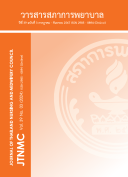Effects of a Self-Efficacy Enhancement Program on Heart Failure Care Behaviors and Revisit Rates in Patients with Heart Failure
DOI:
https://doi.org/10.60099/jtnmc.v39i03.268078Keywords:
self-efficacy, care behaviors, revisit rate, emergency department, heart failureAbstract
Introduction Congestive heart failure is a chronic disease that poses a significant public health concern globally. It adversely affects the lives of patients, impacting their day-to-day functioning. Promoting consistent health management behaviors is crucial in improving patients’ quality of life and reducing hospital revisits.
Objective To examine the effects of a self-efficacy enhancement program on heart failure care behaviors and revisit rates in patients with heart failure
Design This quasi-experimental with one group pre-posttest design using Bandura’s self-efficacy concept as the research framework.
Methods Participants included 30 patients with heart failure who visited the emergency department at a super tertiary hospital and were recruited through purposive sampling. The participants received a program consisting of health education about heart failure, skill training for heart failure care, instructions for using the heart failure care manual for patients, and heart failure care monitoring. Data were collected using questionnaires on personal data, care behaviors, and revisit. The content validity index of the program was .83. The reliability of the heart failure care behaviors questionnaire was tested, revealing the Cronbach’s alpha coefficient of .81. Data were analyzed using descriptive statistics, Paired t-test, and Wilcoxon Signed Ranks test.
Results Most of the participants were female (73.33%). Their ages ranged from 42 to 80 years, with a mean age of 69.97 years (SD = 9.90). After participating in a self-efficacy enhancement program, the participants had overall heart failure care behaviors (M = 75.09, SD = 19.15) higher than before the program (M = 55.56, SD = 18.70), with statistical significance (t = -4.143, p < .001). Also, there were significantly higher subscales, including following advice of the healthcare team, seeking consultation, and self-regulation (Z = -2.890, Z = -2.470, Z = -3.330, respectively, p < .001). Furthermore, none of the participants had a revisit associated with heart failure following the program.
Recommendation The self-efficacy enhancement program could enhance heart failure care behaviors and reduce the revisit rate. Healthcare teams can apply the program in caring for patients with heart failure. A further study should employ an experimental design with continuous monitoring to confirm the program’s effectiveness.
Downloads
References
Hoda B, Hummel S. Heart failure in older adults. Can J Cardiol. 2016;32(9):1140-7.
Benjamin EJ, Muntner P, Alonso A, Bittencourt MS, Callaway W, Carson AP, et al. Heart disease and stroke statistics-2019 update a report from the American Heart Association. Circulation. 2019;139(10):e56-e528. https://doi.org/10.1161/cir.0000000000000659 PMID: 30700139
Tasuwanin T, Pothiban L, Khampolsiri T. Effects of self-management enhancement on quality of life and rehospitalization rate among elderly with heart failure. Nursing Journal. 2019;46(4):108-21. Available from:https://he02.tci-thaijo.org/index.php/cmunursing/article/view/230308/156761 (in Thai)
Medical Records and Medical Statistics Service. Statistics of patients receiving services from the emergency department, Siriraj Hospital 2019; Bangkok. (in Thai)
Mulsrisuk S, Monkong S, Sutti N. Symptoms and signs, self-management of symptoms, and emergency department’s management of older adults with congestive heart failure. Journal of Thailand Nursing and Midwifery Council. 2022;37(3):144-58. Available from: https://he02.tci-thaijo.org/index.php/TJONC/article/view/257143/176511 (in Thai)
Promwong W, Siripitayakunkit A, Hanprasitkam K. Evaluation of health care services using a multidisciplinary care model for persons with heart failure at the heart failure clinic, Ramathibodi Hospital. Ramathibodi Nursing Journal. 2019;25(2):166-80. Available from: https://he02.tci-thaijo.org/index.php/RNJ/article/view/151194/150188 (in Thai)
Bandura A. Self-efficacy: toward a unifying theory of behavioral change. Psychological Review. 1977; 84(2):191–215. Available from: https://doi.org/10.1037/0033-295X.84.2.191 PMID: 847061
Riegel B, Moser DK, Buck HG, Dickson VV, Dunbar SB, Lee CS, et al. Self‐care for the prevention and management of cardiovascular disease and stroke. J Am Heart Assoc. 2017;6(9):e006997. Available from: https://doi.org/10.1161%2FJAHA.117.006997 PMID: 28860232
Amaritakomol A. Nursing roles in heart failure clinic. In: Kanjanavanit R, Phrommintikul A, editors. Comprehensive heart failure management program. Chiang Mai: Maharaj Nakorn Chiang Mai Hospital, Faculty of medicine, Chiang Mai University; 2013. p.77-91. Available from: http://www.thaiheart.org/images/column_1291454908/CMU%20HF%20Clinic.pdf (in Thai)
Jaarsma T. Inter-professional team approach to patients with heart failure. Heart. 2005;91(6):832–38. Available from: https://doi.org/10.1136%2Fhrt.2003.025296 PMID: 15894793
Pedcharat W, Namjuntra R, Binhosen V, Porapakkham P. Effects of self-management program on self-management behaviors and readmission of patients with heart failure after valvular heart surgery. Thai Journal of Cardio- Thoracic Nursing. 2017; 28(2): 38-51. Available from: https://he02.tci-thaijo.org/index.php/journalthaicvtnurse/article/view/116704/89722 (in Thai)
Department of Emergency Medicine, Faculty of Medicine Siriraj Hospital, Mahidol University. Guide to patient screening criteria. Bangkok. Faculty of Medicine Siriraj Hospital; 2015. (in Thai)
Norwood SL. Research strategies for advanced practice nurse. Upper Saddle River (NJ): Prentice Hall Health; 2000.
Little R, Rubin D. Statistical analysis with missing data, 3rd ed. Hoboken (NJ): Wiley; 2019.
Jaarsma T, Arestedt KF, Martensson J, Dracup K, Stromberg A. The European Heart Failure Self-care Behaviour scale revised into a nine-item scale (EHFScB- 9): a reliable and valid international instrument. Eur J Heart Fail. 2009;11(1):99-105. Available from: https://doi.org/10.1093/eurjhf/hfn007 PMID: 19147463
Poungkaew A, Sindhu S, Pinyopasakul W, Tresukosol D, Viwatwongkasem C. Evaluation of a health service system for heart failure management in Thailand. Suranaree J Sci Technol. 2018;25(3):295-306. Available from: https://ird.sut.ac.th/journal/sjst/#/los/manuscript/%202300
Downloads
Published
How to Cite
Issue
Section
License
Copyright (c) 2024 The Journal of Thailand Nursing and Midwifery Council

This work is licensed under a Creative Commons Attribution-NonCommercial-NoDerivatives 4.0 International License.








